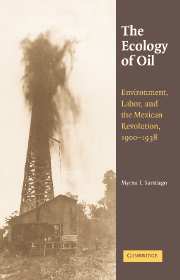Book contents
- Frontmatter
- Dedication
- Contents
- List of Maps, Figures, Tables, and Appendices
- Acknowledgments
- Introduction
- PART ONE THE HUASTECA BEFORE OIL
- PART TWO THE ECOLOGY OF OIL
- PART THREE CHALLENGING THE ECOLOGY OF OIL
- 5 “Coarse in Manner”: Mexican Oil Workers, 1905–1921
- 6 Revolutionaries, Conservation, and Wasteland
- 7 Revolution from Below: The Oil Unions, 1924–1938
- Conclusion
- Epilogue
- Appendices
- A Note on the Sources
- Archives Consulted
- Selected Bibliography
- Index
7 - Revolution from Below: The Oil Unions, 1924–1938
from PART THREE - CHALLENGING THE ECOLOGY OF OIL
Published online by Cambridge University Press: 05 March 2015
- Frontmatter
- Dedication
- Contents
- List of Maps, Figures, Tables, and Appendices
- Acknowledgments
- Introduction
- PART ONE THE HUASTECA BEFORE OIL
- PART TWO THE ECOLOGY OF OIL
- PART THREE CHALLENGING THE ECOLOGY OF OIL
- 5 “Coarse in Manner”: Mexican Oil Workers, 1905–1921
- 6 Revolutionaries, Conservation, and Wasteland
- 7 Revolution from Below: The Oil Unions, 1924–1938
- Conclusion
- Epilogue
- Appendices
- A Note on the Sources
- Archives Consulted
- Selected Bibliography
- Index
Summary
Property owned by foreigners, enterprises conducted by foreigners, will never be safe in Mexico so long as their existence and the method of their use and conduct excite the suspicion and, upon occasion, the hatred of the people of the country itself.
President Woodrow Wilson, October 1916You understand that what we are interested in is extracting Mexico's oil; we are here exclusively for that. That is why I, and the other managers, have suffered through these climates for years. The companies…are not charity organizations.
El Aguila Personnel Manager, Hume, 1937If the challenges to the ecology of oil posed by the revolutionary state did not yield fruit, it would seem that a labor force devastated since 1921 could hardly do better. That impression, however, is mistaken. Ten years of intensive political education had left a deep imprint in the workers and their work culture. At the same time, the weakness of the revolutionary state meant that even if Mexico City had lost patience with radicals, local authorities could be flexible. Thus, workers who survived the 1921 debacle returned to the offensive in the mid-1920s. They made organizational advances and unionized the labor force at last. The emergence of political differences among the unions, however, meant that a significant minority failed to negotiate contracts and experienced the dissolution of their unions in the late 1920s. Key to the victories and the defeats were several local officials: the lawyer Emilio Portes Gil, the governor of Veracruz, Adalberto Tejeda, and the general Lázaro Cárdenas. Their intervention would have long-lasting consequences in the life of the unions.
The economic depression that engulfed the Mexican oil industry in the second half of the 1920s and merged into the Great Depression of the 1930s affected union activity as well. The unions split internally between those who wanted stability and a fringe that agitated for militancy. The Depression became a period of intense intraunion struggle in Tampico and the Huasteca, while a militant second generation of oil workers took over union leadership in new production sites in the Isthmus of Tehuantepec, Poza Rica, and Atzcapotzalco. In northern Veracruz the radicals' rise to leadership coincided with the ascent of Lázaro Cárdenas to the presidency in 1935.
- Type
- Chapter
- Information
- The Ecology of OilEnvironment, Labor, and the Mexican Revolution, 1900–1938, pp. 291 - 342Publisher: Cambridge University PressPrint publication year: 2006



